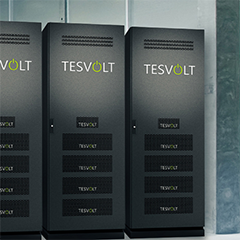Michael Geib, Vice President of Global Sales and Christian Went, International Account Manager at TESVOLT, came in to PES to catch us up on their latest lithium-ion battery storage systems. The UK market is of interest, one reason being the flexible tariffs.
PES: We are pleased to welcome you back to PES Solar/PV magazine. For our new readers, could you please begin by explaining a little about the background of your organisation and how you currently serve the solar/PV industry?
Christian Went: TESVOLT specialises in high-performance lithium-ion battery storage systems. These systems are used primarily in the commercial and industrial sectors, where battery performance requirements differ from those in the domestic storage market. To meet these requirements, we combine top quality battery inverters and lithium cells with a proprietary battery management system (BMS).
Our aim is to minimise the loss of power when the battery is being charged and discharged. Lithium batteries are more energy-efficient than other storage technologies and thanks to the unique BMS from TESVOLT, they can be flexibly combined and easily expanded, even after several years.
Our systems can be configured to any value from 4.8 kWh up to several megawatt hours, depending on the client’s requirements. The exceptional reliability, high output and long service life of our storage systems is due to their prismatic cells, developed by Samsung SDI and TESVOLT’s proprietary Active Battery Optimizer.
Michael Geib: Our company, which is based in Wittenberg in Germany, was founded in 2014 by Daniel Hannemann and Simon Schandert with the aim of promoting the use of renewable energies generated by the sun, wind, water and biogas. From the outset, the company’s intellectual capital included the extensive experience that many TESVOLT employees had acquired in the photovoltaic sector.
The need for battery storage systems is growing at the same rate as the expansion of renewable energies, especially photovoltaic energy. Storage systems are used to even out consumption to compensate for the daily and seasonal fluctuations in energy yields, thereby helping clients to time shift as much as possible and improve their self-sufficiency rate.
The range of potential applications is extremely wide and storage systems can also be used to meet needs such as, emergency power or peak load capping. Here in the UK our energy storage systems have become a valuable option for avoiding Triad, Red Zone, or CM levy charges.



























